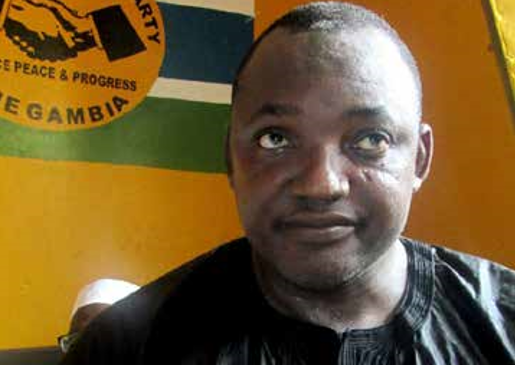
Gambia’s newly elected president has vowed to free all political prisoners and urged exiles who fled the 22-year reign of Yahya Jammeh to return from abroad and help him reform the tiny West African country, writes Carley Petesch
“A new Gambia is born,” Adama Barrow said in an interview with The Associated Press the day after his upset election win. “We want everybody on board now. This is Gambia, politics is over.”
A former businessman and now real estate mogul who became the unlikely head of a formidable opposition coalition, Barrow, 51, said he plans to preside during a three-year transition before another presidential election is held.
He also said he planned to reverse Jammeh’s decisions to pull out of both the Commonwealth, a group made up mostly of former British colonies, and the International Criminal Court, which prosecutes atrocities and other human rights abuses.
South Africa, Burundi and Gambia all have announced plans to withdraw, saying the court unfairly singles out African nations.
“The ICC is advocating for good governance. If you want to be part of that, I think there is no need for you to withdraw from the ICC,” Barrow said.
Raucous celebrations erupted Friday after Gambia’s election commission announced Barrow had won the Thursday vote, earning 45 percent of the total compared to Jammeh’s 36 percent.

The streets were calmer on Saturday, but Gambians still were clearly excited about the pending transfer of power, marveling at the fact that Jammeh had conceded defeat in a phone call aired on state television Friday night.
Barrow, too, was optimistic about the future.
“I’m very happy because everybody thought that it was impossible, and the impossible became possible,” he said in the interview at his modest home east of the capital, Banjul.
On Saturday, relatives, friends and coalition leaders gathered under trees out on the lawn, and Barrow was greeted with cheers, hugs and a local prayer singer. He said his two wives, five children and mother would join him in Gambia’s State House when he assumes office in January.
While officially elected to a five-year term, Barrow noted that he had agreed to serve only three years with a goal of repairing Gambia’s democracy before making way for new leadership.
“When we get that done, then the foundation is there, and myself, I will not be in the political scene,” he said.
Barrow said he also would prioritize reviving the country’s stagnant economy and improving Gambia’s relationships within the international community.
The United States was among the many countries critical of the human rights situation under Jammeh, who stood accused of heading a government that tortured opponents and silenced all dissent.
On Saturday, Secretary of State John Kerry congratulated Barrow on his win and noted that his inauguration as president would mark Gambia’s first democratic transfer of power.
“We call for unity and calm during this transition period,” Kerry said.
In addition to recommitting Gambia to the International Criminal Court, Barrow said his government would examine abuses committed under Jammeh while remaining committed to due process and administering justice that would not be “personal.”
He also promised reforms to the security forces, which were accused of many abuses under Jammeh.
“We will improve their training to give them the professionalism to do their job,” Barrow said. “With our government, they will be distanced from politics.”
****
editor@indpendent.co.ug
 The Independent Uganda: You get the Truth we Pay the Price
The Independent Uganda: You get the Truth we Pay the Price





